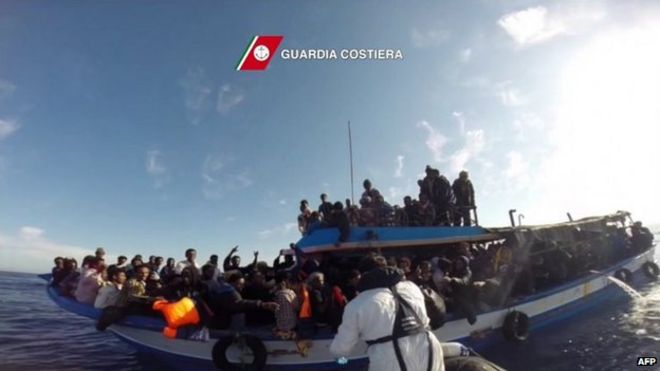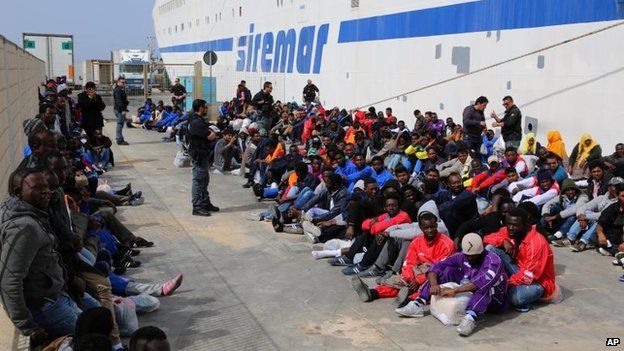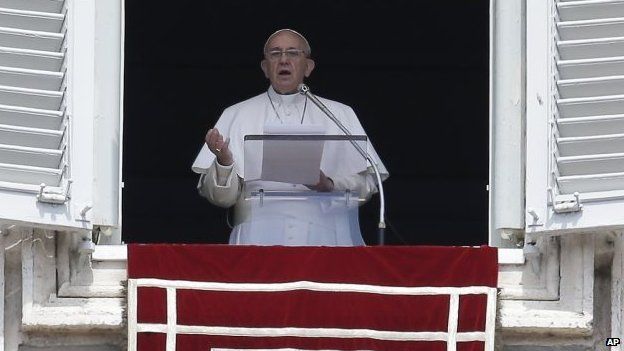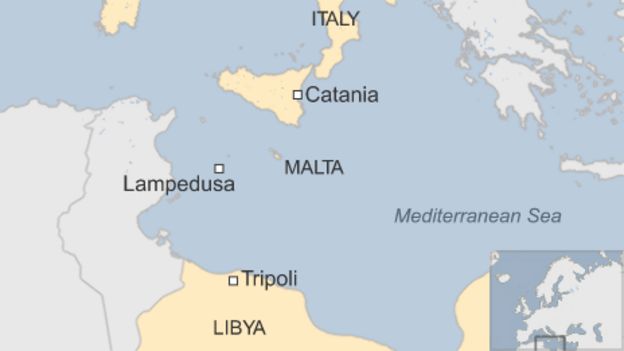
Thousands of migrants have already tried to cross the Mediterranean in rickety boats this year
Hundreds of people are feared to have drowned after a boat carrying up to 700 migrants capsized in the Mediterranean Sea, the Italian coastguard says.
A major rescue operation is under way after the vessel carrying "between 500 and 700 migrants" capsized at midnight local time, in Libyan waters south of the Italian island of Lampedusa.
So far 28 people have been rescued.
Since the start of the year, at least 900 other migrants are thought to have died crossing the Mediterranean Sea.
In the past week alone, Italy's coastguard rescued 10,000 migrants whose vessels ran into trouble.
Italian ships, the Maltese Navy and commercial vessels are all involved in the rescue operation, 130 miles (210km) off the coast of Lampedusa and 17 miles (27km) from the Libyan coast.
The Italian coastguard's spokesman told the BBC the operation was still focused on search and rescue, "but in time it will be a search [for bodies] only".
Twenty ships and three helicopters were currently involved in the rescue, he added.

At the scene: Richard Bilton, BBC News, Lampedusa

Lampedusa is scrambling to react to the latest horror in the seas off its coastline. Much of the harbour has emptied. Coastguard, customs and fishing boats all left before dawn to help with the rescue.
Marta Bernardini works for the charity Mediterranean Hope, which is based on the island and works with migrants. She told the BBC: "We are very sad. It's so difficult for us who live and work in Lampedusa every day, to know that a lot of people die in this way, in the Mediterranean Sea."
Lampedusa is the most southerly point of Italy - nearer Africa than the Italian mainland. Locals say that since January - when the EU took control of patrolling Europe's maritime borders - between 9,000 and 10,000 migrants have arrived on the island.
There are currently 1,000 migrants in a detention centre on Lampedusa - an island of 5,000 people. Three hundred migrants are being moved to Sicily on Sunday.

Twenty-four bodies had been retrieved so far and placed on the Italian coastguard ship Gregoretti.
Maltese Prime Minister Joseph Muscat said rescuers were "literally trying to find people alive among the dead floating in the water".
If confirmed, it would be the biggest migrant tragedy to have taken place in the Mediterranean in recent times, he added in quotes carried by the Times of Malta newspaper.
Pope Francis expressed his "deepest sorrow" for the sinking and appealed to the international community to prevent such incidents from happening again.
"These are men and women like us who seek a better life. Hungry, persecuted, injured, exploited, victims of wars. They were looking for happiness," he said.

The migrants reportedly fell overboard when they rushed to draw the attention of a passing merchant vessel, causing their ship to capsize.
Mark Micallef, a journalist with the Times of Malta, told the BBC such incidents were "not at all uncommon".
"Merchant vessels... ill equipped to do rescues, [are] being tasked to do a job they're not designed for," he said.
Many of the bodies recovered will be brought to the Italian island Sicily, authorities in Catania told the BBC.

The number of migrants crossing the Mediterranean this year is expected to surge as weather conditions improve.
A maritime rescue operation run by Italy, Mare Nostrum, ended last year after some EU members said they could not afford it and amid concerns it was encouraging more migrants. The EU now runs a more limited border control operation called Triton.
Triton has come in for criticism for not being as far-reaching as its predecessor.
While Mare Nostrum had a monthly budget of €9.5m ($10.3m; £9.6m) and covered much of the Mediterranean, Triton's budget is less than a third of that at €2.9m ($3.1m), and its remit extends only into Maltese and Italian waters.
Justin Forsyth, chief executive of aid group Save the Children, urged the EU to restart rescue operations.
"The scale of what is happening in the Mediterranean is not an accident, it is a direct result of our policy," he said.
However, the European Commission's migration spokeswoman Natasha Bertaud told the BBC last week: "We don't have a silver bullet that will make it [the situation] go away and no amount of finger pointing will change that."
Last year a record 170,000 people fleeing poverty and conflict in Africa and the Middle East made the perilous crossing to Italy. Thousands died making the journey.
CREDIT: BBC





No comments:
Post a Comment